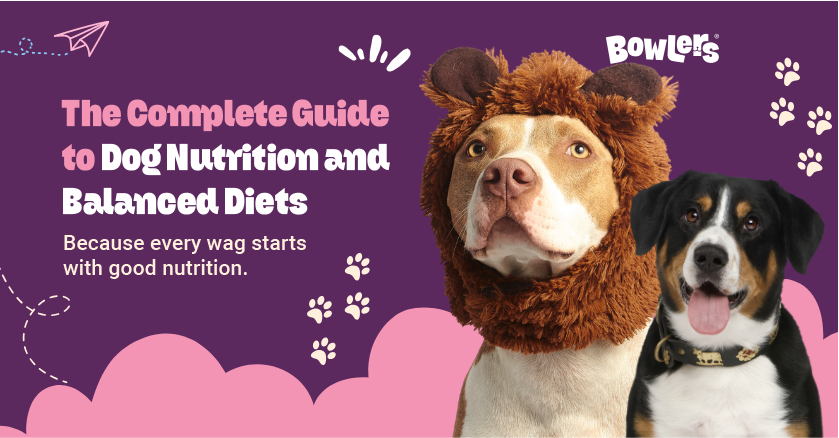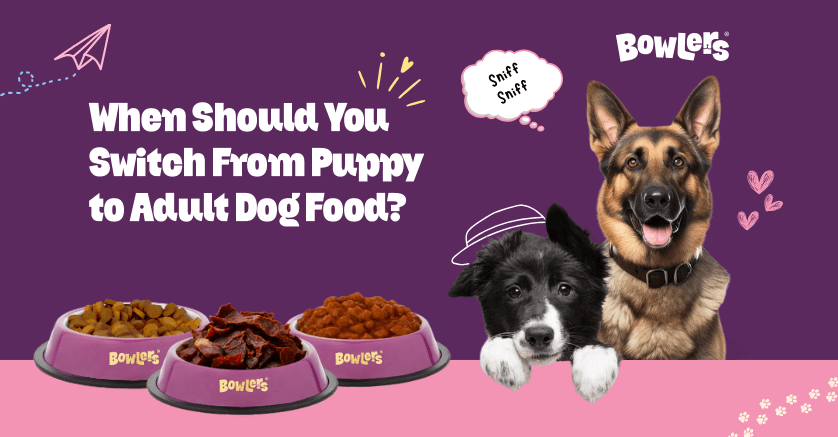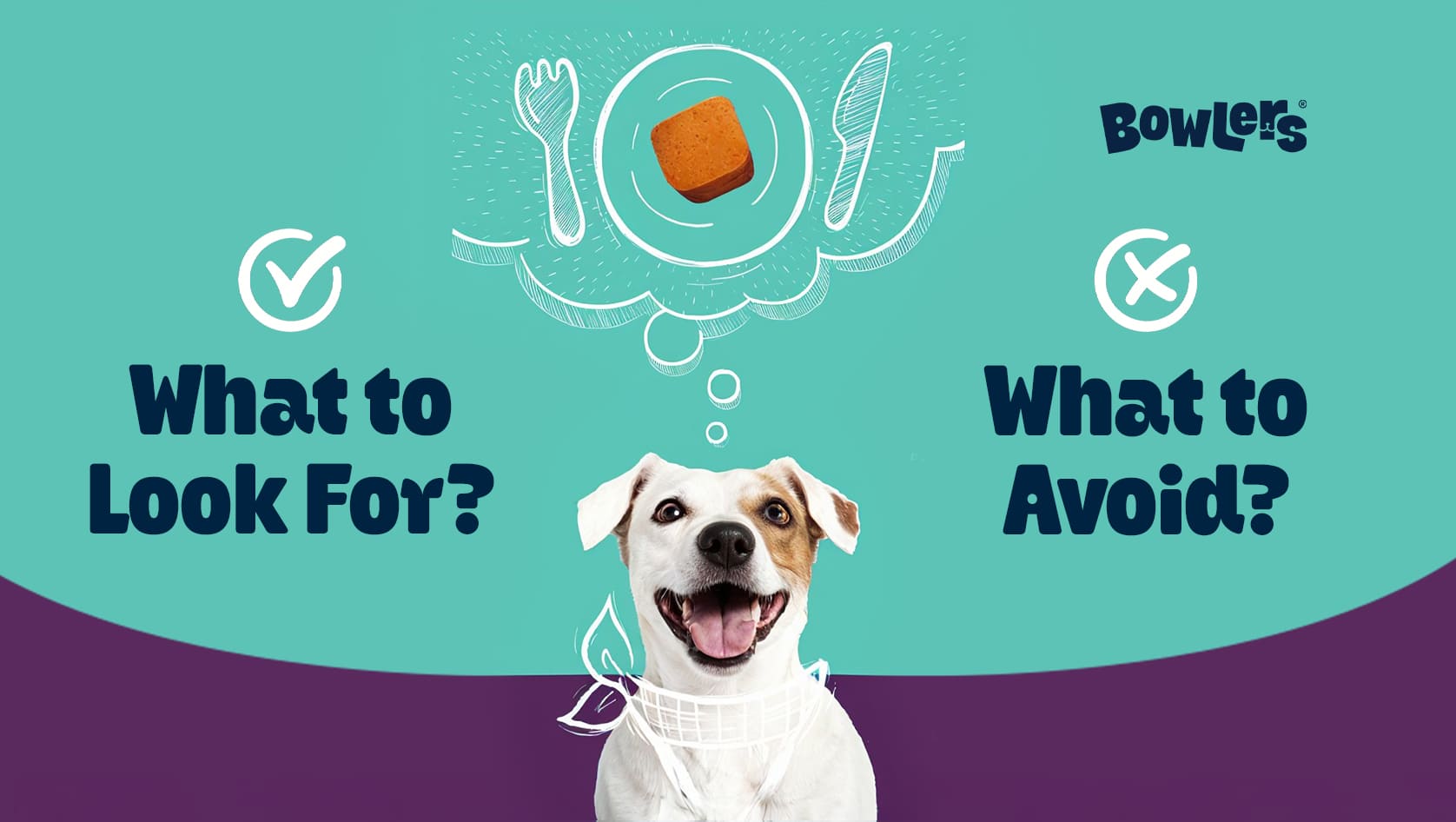Complete Guide to Dog Nutrition and Balanced Diets

Table of contents
- Why Dog Nutrition Matters
- Core Nutrients in a Balanced Dog Diet
- Choosing the Best Dog Food for All Breeds
- Healthy Dog Food Options: Store Bought vs Homemade
- How to Read Dog Food Labels
- Dog Diet and Feeding Tips
- Common Dog Feeding Mistakes to Avoid
- Tailoring Diets by Life Stage
- Building a Nutritious Diet with Bowlers
Every pet parent wants their dog to live a long, healthy, and happy life. One of the most important aspects of ensuring that is understanding your dog’s nutrition needs. A proper diet affects everything from your pet’s coat and energy levels to their immunity and lifespan.
This dog nutrition guide will help you learn the essentials of a balanced diet for dogs, identify the best dog food for all breeds, and provide useful dog diet and feeding tips you can apply every day.
We believe that nutrition is the foundation of your dog’s well-being. That’s why we have created this complete pet food guide to walk you through everything you need to know about feeding your furry friend.
Why Dog Nutrition Matters
Dogs, like humans, need the right balance of proteins, fats, carbohydrates, vitamins, minerals, and water to thrive. A diet that’s too heavy in one nutrient and lacking in another can cause long-term health problems. For example, too little protein may result in poor muscle development, while excess fat may lead to obesity.
Providing nutritious pet food for dogs means more than just keeping them full, it ensures:
- Stronger immunity to fight infections
- Shinier coats and healthy skin
- Steady energy levels for play and exercise
- Improved digestion and gut health
- Long-term disease prevention
Core Nutrients in a Balanced Dog Diet
When planning a balanced diet for dogs, make sure the following nutrients are part of their daily meals:
1. Protein
Proteins build muscles, repair tissues, and support overall growth. Dogs need high-quality proteins from sources like chicken, fish, lamb, or plant-based proteins for sensitive pets.
2. Fats
Fats provide concentrated energy and help absorb vitamins. Essential fatty acids like Omega-3 and Omega-6 also maintain skin health and coat shine.
3. Carbohydrates
Dogs don’t require carbs as their main energy source, but whole grains, vegetables, and fruits can provide fiber, antioxidants, and slow-releasing energy.
4. Vitamins & Minerals
These micronutrients regulate everything from bone development to nerve function. Calcium, phosphorus, zinc, and vitamin A are crucial.
5. Water
Often overlooked, water is as important as food. Always ensure fresh, clean drinking water is available for your pet.
Choosing the Best Dog Food for All Breeds
Every dog is unique, but certain principles apply across breeds. A high quality dog nutrition guide suggests you look for:
- Complete & balanced formulas approved by veterinary nutritionists
- Protein-first ingredients (like chicken or fish listed before fillers)
- No harmful additives such as artificial colors or excessive preservatives
- Breed-appropriate kibble size for ease of chewing and digestion
Still, breed size plays a role. Large breeds may need food that supports joint health, while small breeds often require calorie-dense meals to sustain energy.
Learn more about this in our upcoming cluster blog: “How Much Should You Feed Your Dog Daily? Breed & Weight Guide.”
Healthy Dog Food Options: Store Bought vs Homemade
Pet parents often wonder: is homemade food better than commercial dog food? Both have pros and cons.
- Homemade diets can be tailored, but they must be carefully balanced. Too much or too little of a nutrient can harm your dog.
- Store-bought diets are convenient and designed to meet nutritional standards, but quality depends on the brand.
We believe in healthy dog food options that combine safety, balance, and taste. Our recipes are made with real ingredients and fortified with essential nutrients.
Curious about this debate? Check our cluster blog: “Homemade Dog Food vs Store Bought: Which is Healthier?”
How to Read Dog Food Labels
Selecting food from a store shelf can be confusing. Pet food labels are often filled with jargon. Here’s a quick breakdown:
- “Complete and Balanced” means the food meets nutrition requirements.
- Ingredients list shows what’s inside, in descending order by weight.
- Guaranteed analysis tells you protein, fat, fiber, and moisture content.
- Feeding guidelines provide suggested serving sizes.
Knowing how to interpret this ensures you’re truly feeding your dog the best dog food for all breeds, not just the most colorful packaging.
Dive deeper into this topic in our cluster blog: How to Read Dog Food Labels: What Every Pet Parent Should Know
Dog Diet and Feeding Tips
Proper feeding goes beyond just choosing food. Here are a few dog diet and feeding tips to help your furry friend stay healthy:
- Stick to a routine – Feed your dog at the same time daily to regulate digestion.
- Measure portions – Avoid overfeeding; obesity is one of the most common health issues in dogs.
- Avoid harmful foods – Chocolate, grapes, onions, sugar, and excessive fatty foods are toxic to dogs.
- Transition gradually – If switching brands, mix old and new food over a week to avoid stomach upsets.
- Consider supplements if needed – Sometimes, omega oils, probiotics, or joint supplements can support specific health concerns.
We cover this in detail in our cluster blog: “Best Supplements for Dogs: Do They Really Need Them?”
Common Dog Feeding Mistakes to Avoid
Even the most loving pet parents can make feeding mistakes. A few common ones include:
- Free-feeding (leaving food out all day) leading to overeating
- Ignoring portion size recommendations
- Not adjusting diet as dogs age or gain/lose weight
Correcting these habits ensures your dog stays at their healthiest weight and enjoys a longer life.
For a detailed guide, read our cluster blog: “Common Dog Feeding Mistakes and How to Avoid Them.”
Tailoring Diets by Life Stage
A complete pet food guide must also consider age:
- Puppies need calorie-dense food with DHA for brain development.
- Adult dogs require maintenance diets to sustain energy without weight gain.
- Senior dogs benefit from lower-calorie diets with added joint support.
Always adapt your dog’s diet as they grow. What works for a puppy won’t work for an adult dog.
Building a Nutritious Diet with Bowlers
Your dog’s diet is the key to their health and happiness. With this dog nutrition guide, you now understand the building blocks of a balanced diet for dogs, how to identify the best dog food for all breeds, and everyday dog diet and feeding tips to keep your furry friend thriving.
At Bowlers, we’re dedicated to making nutritious pet food for dogs that blends taste and science because your dog deserves nothing less than the best.


